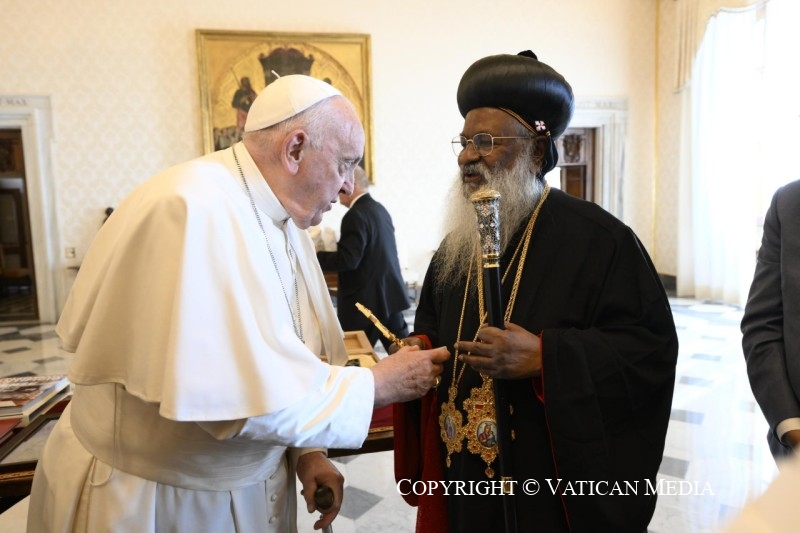Indian Orthodox Baselios Mathews III in audience with Pope Francis
Malankara metropolitan is received at the Vatican. Based in Kerala, his Christian community traces its origins to Saint Thomas and is linked to the Syriac Orthodox Church. The pontiff expressed hope that ecumenism would bring more shared pastoral life, especially where Christians are a minority.
Vatican City (AsiaNews) – Pope Francis met this morning in the Vatican with Baselios Marthoma Mathews III, Catholicos of the East and Malankara Metropolitan of the Malankara Orthodox Syrian Church.
The audience was an important ecumenical event with the head of India’s largest Orthodox community. The Church traces its origins to the preaching of the Apostle Thomas in modern-day India. Since then, it has remained closely linked to the Syriac Orthodox Church
“Here you are at home, as a beloved and long-awaited brother," Pope Francis said as he welcomed the 74-year-old Indian prelate, who has led his community since 2021. The community is based in the Indian state of Kerala but is also found among overseas Indian communities.
In his address, the pontiff mentioned the ecumenical journey undertaken by the two Churches, starting with Vatican Council II (attended by Syro-Malankara observers) and the historic first meeting between a pope and a Syro-Malankara catholicos, in 1964 when Paul VI met with Baselios Augen I, as part of the pontiff’s historic visit to Mumbai (then called Bombay).
Citing the community’s roots in the preaching of the Apostle Thomas, the pope mentioned the famous profession of faith "My Lord and my God!" (Jn 20:28) after the Resurrection of Jesus.
Speaking about “the 1700th anniversary of the first Ecumenical Council, that of Nicaea” in 2025, Francis expressed hope that the two Churches can celebrate together their “undivided faith”.
The pope went to say that Christians should learn from Thomas how to face the "painful injuries inflicted on the Body of Christ, which is the Church" by divisions among Christians.
"If we put our hands together on these wounds," he said; "if, like the apostle, we proclaim together that Jesus is our Lord and our God; if, with humble hearts, we entrust ourselves in wonder to His grace, we can hasten the long-awaited day when, with His help, we shall celebrate the Paschal Mystery at the same altar.”
In view of this, Pope Francis praised the acts of "pastoral collaboration" performed in Kerala "for the spiritual good of the people of God”.
The pontiff cited in particular, "the agreements of 2010 on the shared use of places of worship and cemeteries, as well as on the possibility for the faithful to receive the anointing of the sick, in certain circumstances, in either Church.”
"Ecumenism always has a pastoral character," he explained. Indeed, it is by going forward fraternally in the proclamation of the Gospel and in the actual care of the faithful that we can recognise ourselves as one flock of Christ on a journey.
"In this sense, I hope that pastoral agreements between our Churches, which share the same apostolic heritage, can be extended and boosted, especially in contexts where the faithful find themselves in a minority or diasporic situation.”
Lastly, the pope expressed his joy at the fact that a fraternal delegate of the Malankara Orthodox Syrian Church will also participate in the upcoming Assembly of the Synod of Bishops of the Catholic Church, which will open in Rome on 4 October.
"I am convinced that we can learn much from the centuries-old synodal experience of your Church” Francis said.
“In fact, the ecumenical movement is contributing to the ongoing synodal process of the Catholic Church, and I hope the synodal process can in turn contribute to the ecumenical movement.”
Indeed, "Synodality and ecumenism are two paths that go together, sharing the same goal, that of communion, which means a better witness by Christians so that the world may believe.”







.png)










